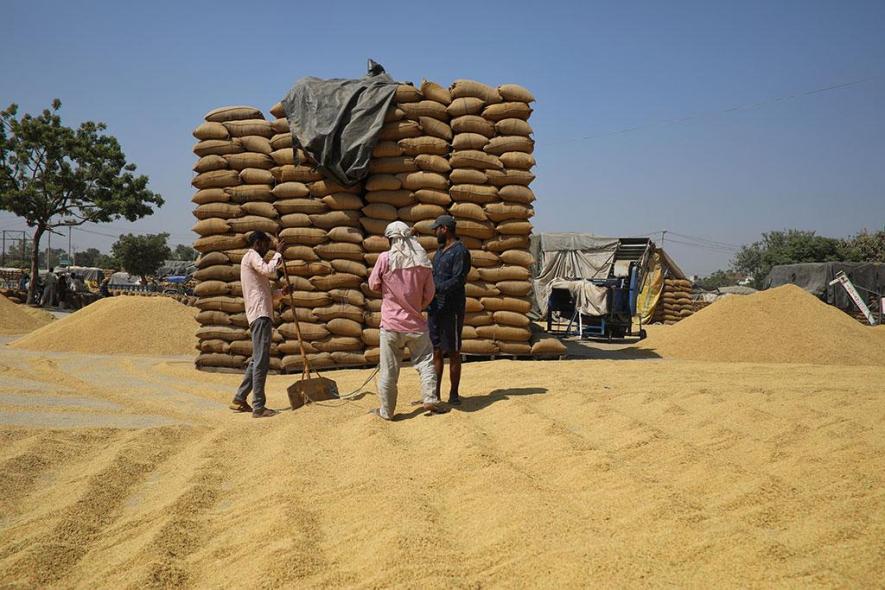What the Dhand Anaj Mandi Tells us about Farm Laws and their Implications

Image Courtesy: DownToEarth
Desolate. It is the first word that comes to mind when one sees images of Dhand Anaj Mandi, one of the prominent APMC (Agricultural produce market committee) markets in Haryana’s Kaithal district. The market campus, spread over 40 acres, was used to witnessing scores of farmers who would come by to sell their produce during the harvesting season. However, this season has brought with it a scenario which no commission agent, worker or farmer had expected.
A change in rules has put them all in a fix after state agencies told farmers to queue up outside the silos of a leading Gujarat-based agri company in Kaithal to dump their produce. The farmers and Arthiyas (middlemen or service providers) allege that the new process is not only harrowing, but has displaced workers who migrated from Bihar and Uttar Pradesh to find jobs en masse.
Monu Kumar, who had been to a silo, told Newsclick over the phone that officials outright rejected his crop even though it met the standards set by the Food Corporation of India (FCI). “When they checked for moisture, it was 10% below the 12% standard moisture content. The reason they gave for denying purchase was that the grain was too black. How is it my fault if there had been a thunderstorm in our area?” he asked.
Kumar said that thousands of farmers like him have been queueing outside the silo for between 16 to 20 hours in their tractors just to sell their produce. "I had no choice but to hire a tractor on rent for the entire day. This costs me between Rs 4,000 to Rs 5,500 depending on diesel consumption Earlier, this cost was just Rs 500. We had to unload our produce at the market. In the current process there is even no scope for public convenience. The mandis had tin sheds where one could rest easily and protect the produce from untimely rains," he added.
Arthiyas who spoke to Newsclick maintained that not only are commision agents facing an existential crisis, but that the local mandi economy has been decimated as well. After harvesting the produce, the farmers take it to the APMC mandi where a local arhtiya would provide labour for unloading and clearing the material. Later, he would facilitate the sale of produce to the agencies appointed by the food supplies department. The selling process in big mandis – if it has two agencies – will be done on alternate days to each body. Till the sale was completed, a farmer usually stayed at the mandi.
Vinod Kumar, a commission agent, said they had been employing workers during the season. With bigger silos – where the entire process is automated – owned by big corporate companies coming into the picture, they did not employ workers this time. “Firstly, the food supplies department and HAFED did not provide us with filling bags. So, we had no other option but to send the farmers directly to silos. Secondly, we usually employed an accountant or munim who would keep a count of workers employed by us. With the workers gone, why would anybody employ a munim now?” Kumar went on to explain that the local economy of mandis, which would provide employment to street vendors and local restaurants has been decimated too.
Kuldeep Singh, a worker, who had until now been working as a palledar or unloader said that the process has deprived workers of at least five months of work. “As of now I am working in Pehowa mandi because bardana (bags) are easily available here. This mandi is 12 kilometres away from my home though. Thousands of workers who were working in Dhand Mandi, are unemployed. After working in a mandi during the season, we worked at railway stations to load the produce stacked in bags for four months in a year. That work is now gone as well since silos have automated machines which can unload material weighing hundreds of metric tonnes in a matter of minutes directly into train quarries," he said.
Prem Chand, vice-president of the All India Agricultural Workers' Union, Haryana, said that the decision of not providing filling bags to APMC mandis cannot be seen as an isolated decision taken by the food and supplies department. Chand was part of a group of farmer and worker leaders who visited the mandi to take stock of the new situation. He alleged that It was an extension of the new Farm Laws which made mandis a "prime target".
"What will happen when silos, as mammoth as the current ones with a capacity of two lakh metric tonnes, pop up in different locations across the state?” The state is already witnessing protests at eight locations against erecting silos, with Panipat and Palwal being prominent ones.
“Once the mandis are finished the farmers will have no option but to go to the open market to sell their produce. Till date, the FCI is only procuring wheat and rice at the minimum support price (MSP). We hear a clamour to privatise FCI. This aside, farmers come to mandis to sell other crops here too. If the mandi is finished, the entire food market will be in the clutches of big traders. The tax revenue in market boards resulted in our rural infrastructure being built and approach roads were made.The whole system was built with years of hard labour. It would be decimated and the saddest part is that our governments are party to this plunder,” he said.
Get the latest reports & analysis with people's perspective on Protests, movements & deep analytical videos, discussions of the current affairs in your Telegram app. Subscribe to NewsClick's Telegram channel & get Real-Time updates on stories, as they get published on our website.
























